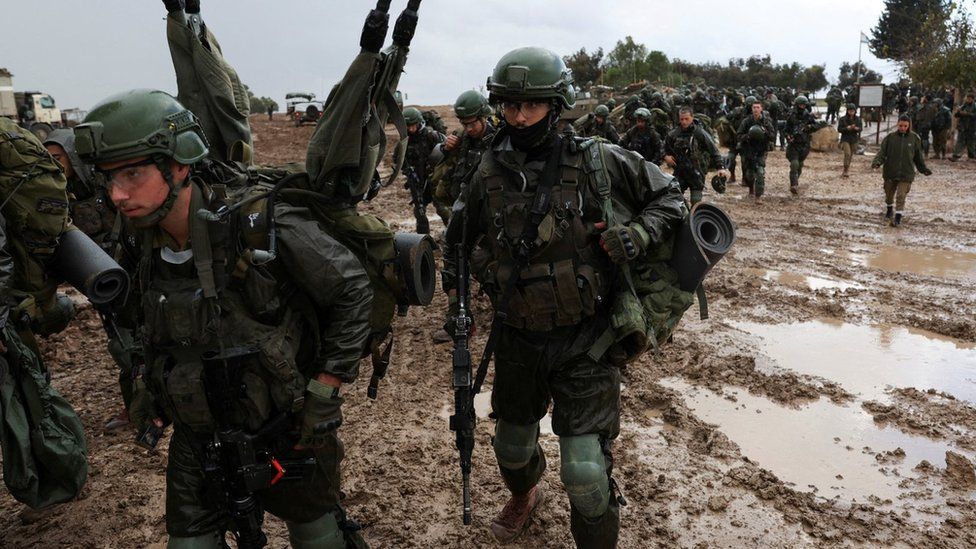ARTICLE AD BOX
 Image source, Reuters
Image source, Reuters
By David Gritten & Hugo Bachega
BBC News, London and Jerusalem
Israel's foreign minister has said it will continue the war in Gaza "with or without international support".
A ceasefire at this stage of the conflict would be "a gift" to Hamas and allow it to return, Eli Cohen warned.
Israel is facing mounting pressure over the number of Palestinian civilians killed by its military in Gaza and the worsening humanitarian crisis there.
On Tuesday, the UN General Assembly overwhelmingly adopted a resolution calling for an immediate ceasefire.
And in his strongest comments yet, US President Joe Biden said Israel was losing support worldwide because of its "indiscriminate bombing" of Gaza.
Intense fighting continued in both the north and south of Gaza on Wednesday, while heavy rains worsened conditions for the hundreds of thousands of displaced people who are living in makeshift tents or out in the open.
A senior UN aid official also warned that the Palestinian territory faced a "public health disaster" because of the collapse of its medical system and the spread of infectious diseases in overcrowded shelters.
The war was triggered by an unprecedented attack by Hamas gunmen on southern Israel on 7 October, in which at least 1,200 people - including many women and children - were killed and about 240 taken hostage.
Since then, more than 18,600 people have been killed in Gaza, about 70% of them women and children, according to the Hamas-run health ministry.
More on Israel-Gaza war
At Tuesday's emergency session of the UN General Assembly, 153 member states voted in favour of a non-binding resolution demanding an "immediate humanitarian ceasefire" in Gaza, and "the immediate and unconditional release of all hostages, as well as ensuring humanitarian access".
Eight states joined Israel and the US in voting against the resolution, including Austria and the Czech Republic, while the UK and Germany were among the 23 states which abstained.
It was put forward by Arab and Muslim states after the US vetoed a binding resolution at the UN Security Council last Friday, saying an immediate ceasefire would allow Hamas to regroup.
The day after the General Assembly vote and President Biden's warning, Eli Cohen told a visiting diplomat: "Israel will continue the war against Hamas, with or without international support."
"A ceasefire at the current stage is a gift to the terrorist organisation Hamas, and will allow it to return and threaten the residents of Israel," he added, according to a statement from his office.
So far, the US has supported Israel's opposition to a pause in hostilities.
But senior American officials are increasingly demonstrating discontent with the way Israel is conducting its offensive.
On 2 December, Defence Secretary Lloyd Austin warned that Israel risked replacing a "tactical victory with a strategic defeat" if it did not sufficiently protect civilians in Gaza.
Disagreements are also emerging about what a post-war Gaza will look like.
On Thursday, White House National Security Adviser Jake Sullivan will arrive in Israel for talks with Prime Minister Benjamin Netanyahu.
Israeli media report that their discussions will include a timetable for the end of the war - and some suggest that Mr Netanyahu, by openly disagreeing with the Biden administration, is trying to appeal to his right-wing base.
Speaking with Israeli military commanders serving in Gaza on Tuesday afternoon, Mr Netanyahu said the war would "continue until the end, until the victory, until the elimination of Hamas".
And, reflecting "international pressures", he added that "nothing will stop us".
However, as previous Israeli wars show, calls for a ceasefire will soon become too loud to be ignored.
Israel is continuing to pound Gaza in the meantime, but Hamas and its allies are fighting back.
Tuesday was the deadliest day for the Israeli military since its ground offensive began on 27 October.
The military said 10 soldiers were killed, almost all of them in a co-ordinated ambush in the Shejaiya district of Gaza City, where there has been a focus of the ground operation in recent days.
Hamas fighters "threw explosives at the soldiers and shot at them from inside a residential building in which underground terror infrastructure was also located", according to a statement.
Hamas said the announcement confirmed the "failure" of Israel's leaders and military in the face of "strong resistance" from the group's armed wing.
The UN's local humanitarian co-ordinator, Lynn Hastings, told reporters: "What is happening on the ground is not going to bring peace and security to either the Palestinians or Israelis for many, many years, if not generations to come. So a ceasefire is in the interest of everybody at the moment."
She warned that the number of Palestinians being killed and injured was going up significantly every day and that almost half of Gaza's 2.3 million population had fled to the southern Rafah area, on the border with Egypt, in an attempt to avoid the Israeli bombardment.
The collapse of the healthcare system, with only one-third of hospitals partially functioning, combined with the unsanitary conditions at overcrowded shelters, also meant there was "a textbook formula for epidemics and a public health disaster", she added.
The UN estimates there have so far been 360,000 cases of infectious diseases, including meningitis, respiratory infections and diarrhoea, which is a leading cause of death among children under the age of five worldwide.

 1 year ago
31
1 year ago
31








 English (US) ·
English (US) ·